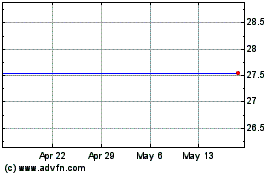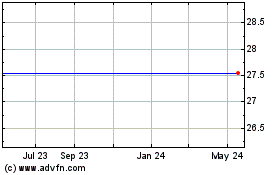HONG KONG—Chinese Internet giant Alibaba Group Holding Ltd. is
in discussions to buy a controlling stake in Hong Kong's SCMP Group
Ltd., according to a person familiar with the situation, in a deal
that would put the largest local English language newspaper in the
hands of a mainland Chinese company.
The potential deal between Malaysian tycoon Robert Kuok and
Alibaba Group would mark a push by the Chinese Internet company to
deepen its reach into the media world beyond its current interest
in film assets and domestic Chinese media. Alibaba has feuded with
the South China Morning Post in the past, most notably over an
interview in which Alibaba founder Jack Ma made controversial
comments about the Tiananmen Square uprising.
The financial terms of the deal are still under discussion and
recent media reports about a potential purchase of SCMP Group by
Alibaba and its executive chairman Jack Ma could negatively impact
the likelihood of a deal being completed, the person familiar with
the situation said. The deal has been under discussion for months,
the person said.
Alibaba Chairman Jack Ma, during an interview with Bloomberg TV
earlier this month during the company's annual shopping promotion,
Singles' Day, had been coy about his interest in the newspaper, but
suggested such a deal would benefit both sides.
"We need media to help our small medium sized companies to
promote," Mr. Ma said in the interview. "And by the way, our
advertisement dollars (are) huge, and media can definitely, using
our data, they can tell the economy in a more accurate way."
Asked directly if he was buying the paper, Mr. Ma said: "I
cannot say that. I'm watching a lot of companies right now."
The SCMP and Alibaba declined to comment.
If a deal was completed, Mr. Ma would join Amazon.com found Jeff
Bezos as an Internet entrepreneur who embraced the traditional news
media. Unlike some struggling newspapers, the Post is profitable,
taking in pages of ads from the city's luxury goods sellers and
real-estate developers. SCMP Group's annual revenues topped HK$1
billion for three straight years to 2014, with adjusted operating
profit of HK$167.7 million last year, according to company
filings.
The deal also could feed into Alibaba's overall international
growth strategy and ambitions in the media. A former Alibaba
executive, Alvin Chiang, said an acquisition of the South China
Morning Post could be in line with the company's moves to expand
abroad. Hong Kong, a former British colony, is a special
administrative region of China that operates with a different
political and legal system than other parts of China. The Hong Kong
newspaper is also well known in Southeast Asia, a market that
Alibaba is trying to grow in.
"Jack Ma and his management have been making efforts in
preparing to enter more overseas markets," Mr. Chiang said. "SCMP
can be an important window facing Southeast Asia."
Such an investment could also reflect Jack Ma's overall interest
in media and culture-related businesses, Mr. Chiang also said.
Alibaba's earlier investments in this sector include paying $200
million for a 30% stake in China Business News, a financial media
company, in June, and recently buying the four-fifths of Chinese
online video provider Youku Tudou Inc. it didn't already own. The
investments follow an alliance made between Alibaba and Shanghai
Media Group in November last year to work together on financial
services and business news.
An investment by Mr. Ma or his company in a newspaper in Hong
Kong would likely be viewed favorably by the Chinese government and
may help the businessman gain more political capital, said Willy
Lam, an expert in elite Chinese politics at the Chinese University
of Hong Kong.
"I'm sure that Alibaba would enjoy Beijing's blessings because
Beijing's policy towards Hong Kong has been hardened. They're
turning the screws on Hong Kong and they want tighter control of
the media," said Mr. Lam. "Encouraging Chinese businesses to
acquire Chinese media would be one way to ensure control."
Beijing has been tightening its control over Hong Kong since
last year's Occupy movement shut down portions of the city.
Following the protests, the SCMP's website was blocked in China for
about a year and was recently unblocked.
Alibaba and its chairman Mr. Ma had a high-profile dispute with
the South China Morning Post in 2013 when Alibaba said Mr. Ma's
quotes were misinterpreted because some words were omitted from an
interview transcript, in which Mr. Ma reportedly referred to the
1989 crackdown on protesters in Tiananmen Square as the "most
correct decision" at the time.
"I was trying to describe the circumstances under which I made
tough decisions when I was [chief executive] of the company," Mr.
Ma had said in a written statement at the time. "Regrettably my
remarks as reported [by the Morning Post] did not reflect what I
told the reporter, and caused a terrible misunderstanding."
Wang Xiangwei, who recently stepped down as the South China
Morning Post's editor in chief, stood by the article at the time of
the dispute with Alibaba.
The Post has been considered an independent voice in a region
heavy with state-controlled media, though critics have said the
newspaper has softened its stance on mainland China in recent
years. A front-page headline in September, the day after China held
a huge military parade to mark the end of World War II, said "Awe
and Peace."
Alibaba has over the years built and maintained strong relations
with the Chinese government by positioning its e-commerce
businesses as aiding Beijing in achieving its economic goals of
creating jobs and helping businesses.
It was embroiled in a rare dispute in late January with China's
State Administration for Industry and Commerce over counterfeits
being sold on its platforms and other issues. But such public
conflicts are rare for the e-commerce giant, and Alibaba claimed
vindication when a damning report on it disappeared from the
regulator's website.
Still, good relations with the government are crucial for
China's Internet companies, which operate in a highly restricted
space. In Alibaba's case, the company has often ventured into
untested waters, such as when it introduced an online, escrow-based
payment system, Alipay, at a time when nonfinancial firms were
prohibited from providing payment services. Alibaba also had two
major foreign backers, Japan's SoftBank Corp. and U.S. search
company Yahoo Inc., adding to scrutiny.
Alibaba strengthened its government ties in 2012 when it raised
$7.1 billion to buy back half of the then-40% stake in the company
held by Yahoo Inc. of the U.S. from investors led by China's
sovereign-wealth fund China Investment Corp.
Last year, Alibaba responded to suggestions in foreign media
reports that such investments conferred political advantage by
saying the investors played no role in the company's management,
board of directors or the company's "partnership" group, which lies
at the heart of the company.
Still, such ties still raise speculation that Alibaba enjoys
special influence among powerful officials. "Those with senior
official patronage would more likely be able to fob off the
regulatory constraints such as the battle between Alibaba and the
SAIC from which apparently Alibaba emerged unscathed," said Mr.
Lam, the analyst.
Write to Wei Gu at wei.gu@wsj.com and Gillian Wong at
gillian.wong@wsj.com
Subscribe to WSJ: http://online.wsj.com?mod=djnwires
(END) Dow Jones Newswires
November 24, 2015 11:35 ET (16:35 GMT)
Copyright (c) 2015 Dow Jones & Company, Inc.
Youku Tudou Inc. American Depositary Shares, Each Representing 18 Class A Ordinary Shares. (NYSE:YOKU)
Historical Stock Chart
From Jan 2025 to Feb 2025

Youku Tudou Inc. American Depositary Shares, Each Representing 18 Class A Ordinary Shares. (NYSE:YOKU)
Historical Stock Chart
From Feb 2024 to Feb 2025
